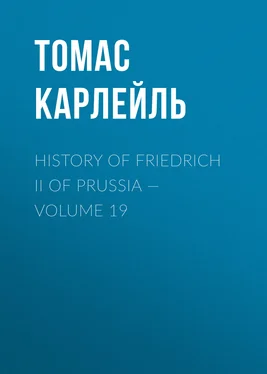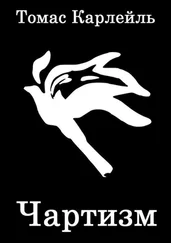Томас Карлейль - History of Friedrich II of Prussia — Volume 19
Здесь есть возможность читать онлайн «Томас Карлейль - History of Friedrich II of Prussia — Volume 19» — ознакомительный отрывок электронной книги совершенно бесплатно, а после прочтения отрывка купить полную версию. В некоторых случаях можно слушать аудио, скачать через торрент в формате fb2 и присутствует краткое содержание. Жанр: foreign_prose, История, literature_19, foreign_edu, foreign_antique, на английском языке. Описание произведения, (предисловие) а так же отзывы посетителей доступны на портале библиотеки ЛибКат.
- Название:History of Friedrich II of Prussia — Volume 19
- Автор:
- Жанр:
- Год:неизвестен
- ISBN:нет данных
- Рейтинг книги:4 / 5. Голосов: 1
-
Избранное:Добавить в избранное
- Отзывы:
-
Ваша оценка:
- 80
- 1
- 2
- 3
- 4
- 5
History of Friedrich II of Prussia — Volume 19: краткое содержание, описание и аннотация
Предлагаем к чтению аннотацию, описание, краткое содержание или предисловие (зависит от того, что написал сам автор книги «History of Friedrich II of Prussia — Volume 19»). Если вы не нашли необходимую информацию о книге — напишите в комментариях, мы постараемся отыскать её.
History of Friedrich II of Prussia — Volume 19 — читать онлайн ознакомительный отрывок
Ниже представлен текст книги, разбитый по страницам. Система сохранения места последней прочитанной страницы, позволяет с удобством читать онлайн бесплатно книгу «History of Friedrich II of Prussia — Volume 19», без необходимости каждый раз заново искать на чём Вы остановились. Поставьте закладку, и сможете в любой момент перейти на страницу, на которой закончили чтение.
Интервал:
Закладка:
Thomas Carlyle
History of Friedrich II of Prussia — Volume 19
BOOK XIX.—FRIEDRICH LIKE TO BE OVERWHELMED IN THE SEVEN-YEARS WAR.—1759-1760
Chapter I.—PRELIMINARIES TO A FOURTH CAMPAIGN
The posting of the Five Armies this Winter—Five of them in Germany, not counting the Russians, who have vanished to Cimmeria over the horizon, for their months of rest—is something wonderful, and strikes the picturesque imagination. Such a Chain of Posts, for length, if for nothing else! From the centre of Bohemia eastward, Daun's Austrians are spread all round the western Silesian Border and the southeastern Saxon; waited on by Prussians, in more or less proximity. Next are the Reichsfolk; scattered over Thuringen and the Franconian Countries; fronting partly into Hessen and Duke Ferdinand's outskirts:—the main body of Duke Ferdinand is far to westward, in Munster Country, vigilant upon Contades, with the Rhine between. Contades and Soubise,—adjoining on the Reichsfolk are these Two French Armies: Soubise's, some 25,000, in Frankfurt-Ems Country, between the Mayn and the Lahn, with its back to the Rhine; then Contades, onward to Maes River and the Dutch Borders, with his face to the Rhine,—and Duke Ferdinand observant of him on the other side. That is the "CORDON of Posts" or winter-quarters this Year. "From the Giant Mountains and the Metal Mountains, to the Ocean;—to the mouth of Rhine," may we not say; "and back again to the Swiss Alps or springs of Rhine, that Upper-Rhine Country being all either French or Austrian, and a basis for Soubise?" [Archenholtz, i. 306.] Not to speak of Ocean itself, and its winged War-Fleets, lonesomely hovering and patrolling; or of the Americas and Indies beyond!
"This is such a Chain of mutually vigilant Winter-quarters," says Archenholtz, "as was never drawn in Germany, or in Europe, before." Chain of about 300,000 fighting men, poured out in that lengthy manner. Taking their winter siesta there, asleep with one eye open, till reinforced for new business of death and destruction against Spring. Pathetic surely, as well as picturesque. "Three Campaigns there have already been," sighs the peaceable observer: "Three Campaigns, surely furious enough; Eleven Battles in them," [Stenzel, v. 185. This, I suppose, would be his enumeration: LOBOSITZ (1756); PRAG, KOLIN, Hastenbeck, Gross-Jagersdorf, ROSSBACH, Breslau, LEUTHEN, (1757); Crefeld, ZORNDORF, HOCHKIRCH (1758): "eleven hitherto in all."] a Prag, a Kolin, Leuthen, Rossbach;—must there still be others, then, to the misery of poor mankind?" thus sigh many peaceful persons. Not considering what are, and have been, the rages, the iniquities, the loud and silent deliriums, the mad blindnesses and sins of mankind; and what amount, of CALCINING these may reasonably take. Not calcinable in three Campaigns at all, it would appear! Four more Campaigns are needed: then there will be innocuous ashes in quantity; and a result unexpected, and worth marking in World-History.
It is notably one of Friedrich's fond hopes,—of which he keeps up several, as bright cloud-hangings in the haggard inner world he now has,—that Peace is just at hand; one right struggle more, and Peace must come! And on the part of Britannic George and him, repeated attempts were made,—one in the end of this Year 1759;—but one and all of them proved futile, and, unless for accidental reasons, need not be mentioned here. Many men, in all nations, long for Peace; but there are Three Women at the top of the world who do not; their wrath, various in quality, is great in quantity, and disasters do the reverse of appeasing it.
The French people, as is natural, are weary of a War which yields them mere losses and disgraces; "War carried on for Austrian whims, which likewise seem to be impracticable!" think they. And their Bernis himself, Minister of Foreign Affairs, who began this sad French-Austrian Adventure, has already been remonstrating with Kaunitz, and grumbling anxiously, "Could not the Swedes, or somebody, be got to mediate? Such a War is too ruinous!" Hearing which, the Pompadour is shocked at the favorite creature of her hands; hastens to dismiss him ("Be Cardinal then, you ingrate of a Bernis; disappear under that Red Hat!")—and appoints, in his stead, one Choiseul (known hitherto as STAINVILLE, Comte de Stainville, French Excellency at Vienna, but now made Duke on this promotion), Duc de Choiseul; [Minister of Foreign Affairs, "11th November, 1758" (Barbier, iv. 294).] who is a Lorrainer, or Semi-Austrian, by very birth; and probably much fitter for the place. A swift, impetuous kind of man, this Choiseul, who is still rather young than otherwise; plenty of proud spirit in him, of shifts, talent of the reckless sort; who proved very notable in France for the next twenty years.
French trade being ruined withal, money is running dreadfully low: but they appoint a new Controller-General; a M. de Silhouette, who is thought to have an extraordinary creative genius in Finance. Had he but a Fortunatus-Purse, how lucky were it! With Fortunatus Silhouette as purse-holder, with a fiery young Choiseul on this hand, and a fiery old Belleisle on that, Pompadour meditates great things this Year,—Invasions of England; stronger German Armies; better German Plans, and slashings home upon Hanover itself, or the vital point;—and flatters herself, and her poor Louis, that there is on the anvil, for 1759, such a French Campaign as will perhaps astonish Pitt and another insolent King. Very fixed, fell and feminine is the Pompadour's humor in this matter. Nor is the Czarina's less so; but more, if possible; unappeasable except by death. Imperial Maria Theresa has masculine reasons withal; great hopes, too, of late. Of the War's ending till flat impossibility stop it, there is no likelihood.
To Pitt this Campaign 1759, in spite of bad omens at the outset, proved altogether splendid: but greatly the reverse on Friedrich's side; to whom it was the most disastrous and unfortunate he had yet made, or did ever make. Pitt at his zenith in public reputation; Friedrich never so low before, nothing seemingly but extinction near ahead, when this Year ended. The truth is, apart from his specific pieces of ill-luck, there had now begun for Friedrich a new rule of procedure, which much altered his appearance in the world. Thrice over had he tried by the aggressive or invasive method; thrice over made a plunge at the enemy's heart, hoping so to disarm or lame him: but that, with resources spent to such a degree, is what he cannot do a fourth time: he is too weak henceforth to think of that.
Prussia has always its King, and his unrivalled talent; but that is pretty much the only fixed item: Prussia VERSUS France, Austria, Russia, Sweden and the German Reich, what is it as a field of supplies for war! Except its King, these are failing, year by year; and at a rate fatally SWIFT in comparison. Friedrich cannot now do Leuthens, Rossbachs; far-shining feats of victory, which astonish all the world. His fine Prussian veterans have mostly perished; and have been replaced by new levies and recruits; who are inferior both in discipline and native quality;—though they have still, people say, a noteworthy taste of the old Prussian sort in them; and do, in fact, fight well to the last. But "it is observable," says Retzow somewhere, and indeed it follows from the nature of the case, "that while the Prussian Army presents always its best kind of soldiers at the beginning of a war, Austria, such are its resources in population, always improves in that particular, and its best troops appear in the last campaigns." In a word, Friedrich stands on the defensive henceforth; disputing his ground inch by inch: and is reduced, more and more, to battle obscurely with a hydra-coil of enemies and impediments; and to do heroisms which make no noise in the Gazettes. And, alas, which cannot figure in History either,—what is more a sorrow to me here!
Читать дальшеИнтервал:
Закладка:
Похожие книги на «History of Friedrich II of Prussia — Volume 19»
Представляем Вашему вниманию похожие книги на «History of Friedrich II of Prussia — Volume 19» списком для выбора. Мы отобрали схожую по названию и смыслу литературу в надежде предоставить читателям больше вариантов отыскать новые, интересные, ещё непрочитанные произведения.
Обсуждение, отзывы о книге «History of Friedrich II of Prussia — Volume 19» и просто собственные мнения читателей. Оставьте ваши комментарии, напишите, что Вы думаете о произведении, его смысле или главных героях. Укажите что конкретно понравилось, а что нет, и почему Вы так считаете.









